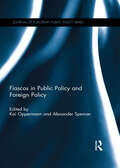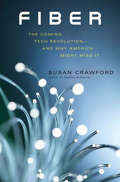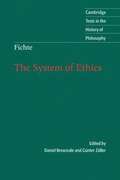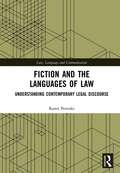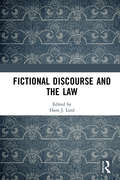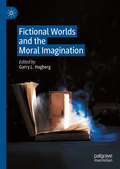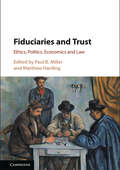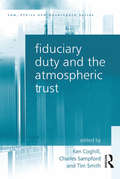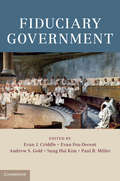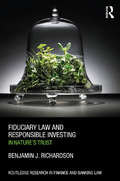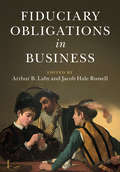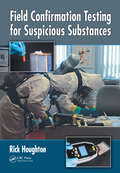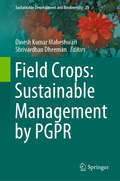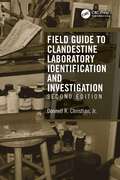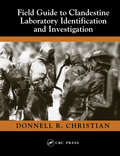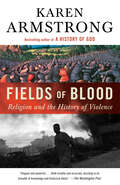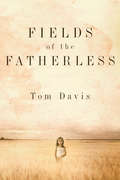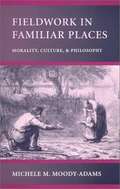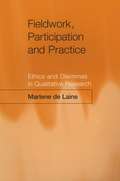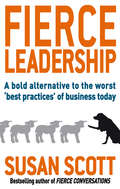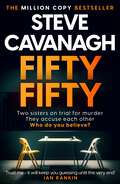- Table View
- List View
Fiancé and Marriage Visas: A Couple's Guide to U.S. Immigration (5th edition)
by Ilona M. BrayFiancé and Marriage Visas makes obtaining a visa and green card as painless as possible for spouses and fiancés. Easy to understand, this one-of-a-kind book demystifies the immigration process, guides readers through the bureaucracy, and provides intensive instructions for each step.
Fiancé and Marriage Visas: A Couple's Guide to U.S. Immigration (7th Edition)
by Ilona Bray Robert L. HerreríaThis guide makes obtaining a visa and green card as painless as possible. It helps couples make sure they're truly eligible and decide the fastest and best application strategy--whether married or unmarried, living in the U. S. or overseas.
Fiascos in Public Policy and Foreign Policy (ISSN)
by Kai Oppermann and Alexander SpencerThe collection brings together scholars from Public Policy and Foreign Policy to address the theme of policy fiascos. So far research on failure and fiascos in both Public Policy and Foreign Policy has existed independent of each other with very little communication between the two sub-disciplines. The contributions aims to bridge this divide and bring the two sides into a dialogue on some of the central issues in the study of fiascos including how to define, identify and measure policy failure (and success); the social and political contestation about what counts as policy fiascos; the causes of policy fiascos and their consequences; the attribution of blame; as well as processes of learning from fiascos. A common theme of the collection will be to explore different epistemological and methodological approaches to studying policy fiascos. The volume appeals to scholars and practitioners interested in policy failures and fiascos both within and among states and other international actors. This book was previously published as a special issue of the Journal of European Public Policy.
Fiber: The Coming Tech Revolution—and Why America Might Miss It
by Susan CrawfordThe world of fiber optic connections reaching neighborhoods, homes, and businesses will represent as great a change from what came before as the advent of electricity. The virtually unlimited amounts of data we’ll be able to send and receive through fiber optic connections will enable a degree of virtual presence that will radically transform health care, education, urban administration and services, agriculture, retail sales, and offices. Yet all of those transformations will pale compared with the innovations and new industries that we can’t even imagine today. In a fascinating account combining policy expertise and compelling on-the-ground reporting, Susan Crawford reveals how the giant corporations that control cable and internet access in the United States use their tremendous lobbying power to tilt the playing field against competition, holding back the infrastructure improvements necessary for the country to move forward. And she shows how a few cities and towns are fighting monopoly power to bring the next technological revolution to their communities.
Fichte: The System Of Ethics
by Johann Gottlieb Fichte Daniel Breazeale Guenter ZöllerFichte's System of Ethics, published in 1798, is at once the most accessible presentation of its author's comprehensive philosophical project, The Science of Knowledge or Wissenschaftslehre, and the most important work in moral philosophy written between Kant and Hegel. Fichte's ethics integrates the discussion of our moral duties into the systematic framework of a transcendental theory of the human subject. Its major philosophical themes include the practical nature of self-consciousness, the relation between reason and volition, the essential role of the drives in human willing, the possibility of changing the natural world, the reality of one's own body, the reality of other human beings, and the practical necessity of social relations between human beings. This volume offers a translation of the work together with an introduction that sets it in its philosophical and historical contexts.
Fiction and the Languages of Law: Understanding Contemporary Legal Discourse (Law, Language and Communication)
by Karen PetroskiContemporary legal reasoning has more in common with fictional discourse than we tend to realize. Through an examination of the U.S. Supreme Court’s written output during a recent landmark term, this book exposes many of the parallels between these two special kinds of language use. Focusing on linguistic and rhetorical patterns in the dozens of reasoned opinions issued by the Court between October 2014 and June 2015, the book takes nonlawyer readers on a lively tour of contemporary American legal reasoning and acquaints legal readers with some surprising features of their own thinking and writing habits. It analyzes cases addressing a huge variety of issues, ranging from the rights of drivers stopped by the police to the decision-making processes of the Environmental Protection Agency—as well as the term’s best-known case, which recognized a constitutional right to marriage for same-sex as well as different-sex couples. Fiction and the Languages of Law reframes a number of long-running legal debates, identifies other related paradoxes within legal discourse, and traces them all to common sources: judges’ and lawyers’ habit of alternating unselfconsciously between two different attitudes toward the language they use, and a set of professional biases that tends to prevent scrutiny of that habit.
Fictional Discourse and the Law
by Hans J. LindDrawing on insights from literary theory and analytical philosophy, this book analyzes the intersection of law and literature from the distinct and unique perspective of fictional discourse. Pursuing an empirical approach, and using examples that range from Victorian literature to the current judicial treatment of rap music, the volume challenges the prevailing fact–fiction dichotomy in legal theory and practice by providing a better understanding of the peculiarities of legal fictionality, while also contributing further material to fictional theory’s endeavor to find a transdisciplinary valid criterion for a definition of fictional discourse. Following the basic presumptions of the early law-as-literature movement, past approaches have mainly focused on textuality and narrativity as the common denominators of law and literature, and have largely ignored the topic of fictionality. This volume provides a much needed analysis of this gap. The book will be of interest to scholars of legal theory, jurisprudence and legal writing, along with literature scholars and students of literature and the humanities.
Fictional Worlds and the Moral Imagination
by Garry L. HagbergThis edited collection investigates the kinds of moral reflection we can undertake within the imaginative worlds of literature. In philosophical contexts of ethical inquiry we can too easily forget that literary experience can play an important role in the cultivation of our ethical sensibilities. Because our ethical lives are conducted in the real world, fictional representations of this world can appear removed from ethical contemplation. However, as this stimulating volume shows, the dichotomy between fact and fiction cannot be so easily categorised. Moral perception, moral sensitivity, and ethical understanding more broadly, may all be developed in a unique way through our imaginative life in fiction. Moral quandaries are often presented in literature in ways more linguistically precise and descriptively complete than the ones we encounter in life, whilst simultaneously offering space for contemplation. The twelve original chapters in this volume examine literary texts – including theatre and film – in this light, and taken together they show how serious reflection within fictional worlds can lead to a depth of humane insight. The topics explored include: the subtle ways that knowledge can function as a virtue; issues concerning our relations to and understanding of each other; the complex intertwining of virtues and vices in the modern world; and the importance of bringing to light and reconsidering ethical presuppositions. With an appreciation of the importance of richly contextualized particularity and the power of descriptive acuity, the volume maps out the territory that philosophical reflection and literary engagement share.
Fiduciaries and Trust: Ethics, Politics, Economics and Law
by Matthew Harding Paul B. MillerSystematic analysis of fiduciaries and trust is rare. The aim of this volume is to help fill this gap. The chapters explore the interactions of fiduciary law and trust, drawing on literatures on trust that have been generated in a variety of disciplines. They do so with an eye to the full scope of extension claimed for the fiduciary principle, from its heartland in private law, to its frontiers in public law and government more broadly. Overall, the volume advances an integrated and wide-ranging understanding of the relation of fiduciaries and trust that illuminates key legal and political problems, and challenges and deepens our understanding of fiduciaries and trust themselves.
Fiduciary Duty and the Atmospheric Trust (Law, Ethics And Governance Ser.)
by Tim Smith Ken Coghill Charles SampfordThis book explores the application of concepts of fiduciary duty or public trust in responding to the policy and governance challenges posed by policy problems that extend over multiple terms of government or even, as in the case of climate change, human generations. The volume brings together a range of perspectives including leading international thinkers on questions of fiduciary duty and public trust, Australia's most prominent judicial advocate for the application of fiduciary duty, top law scholars from several major universities, expert commentary from an influential climate policy think-tank and the views of long-serving highly respected past and present parliamentarians. The book presents a detailed examination of the nature and extent of fiduciary duty, looking at the example of Australia and having regard to developments in comparable jurisdictions. It identifies principles that could improve the accountability of political actors for their responses to major problems that may extend over multiple electoral cycles.
Fiduciary Government
by Paul B. Miller Evan J. Criddle Sung Hui Kim Evan Fox-Decent Andrew S. GoldThe idea that the state is a fiduciary to its citizens has a long pedigree - ultimately reaching back to the ancient Greeks, and including Hobbes and Locke among its proponents. Public fiduciary theory is now experiencing a resurgence, with applications that range from international law, to insider trading by members of Congress, to election law and gerrymandering. This book is the first of its kind: a collection of chapters by leading writers on public fiduciary subject areas. The authors develop new accounts of how fiduciary principles apply to representation; to officials and judges; to problems of legitimacy and political obligation; to positive rights; to the state itself; and to the history of ideas. The resulting volume should be of great interest to political theorists and public law scholars, to private fiduciary law scholars, and to students seeking an introduction to this new and increasingly relevant area of study.
Fiduciary Law and Responsible Investing: In Nature’s trust (Routledge Research in Finance and Banking Law)
by Benjamin J. RichardsonThis book is about fiduciary law’s influence on the financial economy’s environmental performance, focusing on how the law affects responsible investing and considering possible legal reforms to shift financial markets closer towards sustainability. Fiduciary law governs how trustees, fund managers or other custodians administer the investment portfolios owned by beneficiaries. Written for a diverse audience, not just legal scholars, the book examines in a multi-jurisdictional context an array of philosophical, institutional and economic issues that have shaped the movement for responsible investing and its legal framework. Fiduciary law has acquired greater influence in the financial economy in tandem with the extraordinary recent growth of institutional funds such as pension plans and insurance company portfolios. While the fiduciary prejudice against responsible investing has somewhat waned in recent years, owing mainly to reinterpretations of fiduciary and trust law, significant barriers remain. This book advances the notion of ‘nature’s trust’ to metaphorically signal how fiduciary responsibility should accommodate society’s dependence on long-term environmental well-being. Financial institutions, managing vast investment portfolios on behalf of millions of beneficiaries, should manage those investments with regard to the broader social interest in sustaining ecological health. Even for their own financial self-interest, investors over the long-term should benefit from maintaining nature’s capital. We should expect everyone to act in nature’s trust, from individual funds to market regulators. The ancient public trust doctrine could be refashioned for stimulating this change, and sovereign wealth funds should take the lead in pioneering best practices for environmentally responsible investing.
Fiduciary Obligations in Business
by Arthur B. Laby Jacob Hale RussellThe scholarship on fiduciary duties in business organizations is often pulled in two directions. While most observers would agree that business organizations are one of the key contexts for the application of the fiduciary obligation, corporate law theorists have often expressed disdain for the role of fiduciary duties, with the result that fiduciary law and theory have been out of step with the business world. This volume aims to rectify this situation by bringing together a range of scholars to analyze fiduciary relationships and the fiduciary obligation in the business context. Contributing authors examine fiduciary obligations in fields ranging from entity structure to bankruptcy to investment regulation. The volume demonstrates that fiduciary law can inform pressing corporate governance debates, including discussions over stakeholder models of the corporation that move beyond shareholder interests.
Field Confirmation Testing for Suspicious Substances
by Rick HoughtonFrequently a substance found at a port of entry, waste site, laboratory triage facility, or even in a hazardous materials emergency will be labeled and purportedly identified. But law enforcement and other first responders cannot take this claim at face value, as the accuracy is not confirmed and must be verified. A comprehensive handbook for on-th
Field Crops: Sustainable Management by PGPR (Sustainable Development and Biodiversity #23)
by Dinesh Kumar Maheshwari Shrivardhan DheemanThis book discusses the most challenging task ahead of researchers from India and around the globe: providing disease-free field crops for the ever-growing world population. In Asia, despite being cultivated in massive volumes, major crops, including cereals, oil seed, tuber and non-tuber vegetables, and fruit, are not meeting the demands of the increasing population. This book showcases naturally occurring beneficial microbes in the form of plant growth promoting rhizobacteria, or PGPR, which make it possible to grow field crops without applying synthetic chemicals.Our understanding of PGPR has increased exponentially in recent decades. They play a multifarious role in developing sustainable systems of crop production and protection. The book focuses on the mechanistic behaviors of PGPRs, their use to develop sustainable cultivation techniques, and their application to enhance crop growth and productivity at the cutting edge of tech-oriented agriculture and to replace hazardous chemicals with microbial inoculants. The book is useful to agronomists, microbiologists, ecologists, plant pathologists, molecular biologists, environmentalists, policy makers, conservationists, and NGOs working on organically grown field crops.
Field Guide to Clandestine Laboratory Identification and Investigation
by Donnell R. Christian, Jr.Clandestine labs that manufacture drugs or explosives may be encountered virtually anywhere. They can range from complex operations employing scientific equipment and exotic chemicals or simply kitchen utensils and chemicals purchased at a local grocery or hardware store. Regardless of their form, the key to detecting clandestine labs is the ability to recognize the combinations of equipment and chemicals that constitute the lab in the first place. Te first line of defense against the manufacturers—who supply the drug trade and terrorists with their tools of destruction—is law enforcement, the fire services, and other emergency responders. Field Guide to Clandestine Laboratory Identification and Investigation, Second Edition provides the information necessary to recognize operations that produce these deadly brews. As with the prior edition, the book has sections covering the chemicals and equipment commonly used in the manufacture of drugs and explosives. They are grouped in a manner that allows the emergency responder to quickly identify common combinations of equipment and chemicals that could potentially be used to manufacture drugs or explosives. Since many clandestine manufacturing operations use commonly available materials that have legitimate uses, the author outlines how to quickly assess and recognize key indicators associated with clandestine laboratory operations. Sections within the book address information concerning both the hazards associated with those chemicals involved and the personal protective equipment needed to abate the hazards. In addition, documentation requirements, field-testing, and sampling procedures are detailed for use once the operation has been seized and secured. Reproducible worksheets are provided to be used either as, or to supplement, the on-scene investigators’ field notes and assist in providing a standardized manner to objectively record information about the crime scene. The ability to identify the tools used to manufacture contraband drugs and explosives is a key element in the battle against drug abuse and terrorism, making the Field Guide to Clandestine Laboratory Identification and Investigation, Second Edition an indispensible resource for responders and investigators alike.
Field Guide to Clandestine Laboratory Identification and Investigation
by Jr., Donnell ChristianThis book provides information for field use along with reproducible worksheets for crime scene investigators. It presents a list of the chemicals commonly encountered in clandestine laboratories and includes information about chemical hazards and the personal protective equipment required.
Field Sampling for Environmental Science and Management
by Richard Webster Murray LarkScientists and consultants need to estimate and map properties of the terrestrial environment. These include plant nutrients and parasites in soil, gaseous emissions from soil, pollutant metals and xenobiotics in waste and contaminated land, salt in groundwater and species abundances above ground. The scale varies from small experimental plots to catchments, and the land may be enclosed in fields or be open grassland, forest or desert. Those who sample the variables to obtain the necessary data need guidance on the design and analysis of sampling methods for their conclusions and recommendations to be valid. This book provides that guidance, backed by sound rationale and statistical theory. It concentrates on design-based sampling for estimates of mean values of environmental properties, emphasizing replication and randomization. It starts with simple random sampling and then progresses to more efficient designs, such as spatially stratified random sampling, stratification by classes and cluster sampling. It includes a section on purposive sampling in classical soil survey, which is relevant to other environmental properties such as vegetation. It also describes the effects of bulking on errors and the use of ancillary information and regression to improve estimates. The authors draw the important distinction between design-based sampling for estimating means and model-based methods (geostatistics) for local spatial prediction and mapping, and focus on the latter. They describe designs suitable for computing variograms and prediction by kriging, as well as a staged approach, so that sampling is neither inadequate nor excessive, and designs adapt as knowledge is accumulated. Including numerous worked case studies of sampling in agriculture, ecology and environmental science, the book will be of immediate practical value.
Fields of Blood
by Karen ArmstrongFrom the renowned and bestselling author of A History of God, a sweeping exploration of religion's connection to violence. For the first time in American history, religious self-identification is on the decline. Some have cited a perception that began to grow after September 11: that faith in general is a source of aggression, intolerance and divisiveness--something bad for society. But how accurate is that view? And does it apply equally to all faiths? In these troubled times, we risk basing decisions of real and dangerous consequence on mistaken understandings of the faiths subscribed around us, in our immediate community as well as globally. And so, with her deep learning and sympathetic understanding, Karen Armstrong examines the impulse toward violence in each of the world's great religions. The comparative approach is new: while there have been plenty of books on jihad or the Crusades, this book lays the Christian and the Islamic way of war side by side, along with those of Buddhism, Hinduism, Confucianism, Daoism and Judaism. Each of these faiths arose in agrarian societies with plenty of motivation for violence: landowners had to lord it over peasants and warfare was essential to increase one's landholdings, the only real source of wealth before the great age of trade and commerce. In each context, it fell to the priestly class to legitimize the actions of the state. And so the martial ethos became bound up with the sacred. At the same time, however, their ideologies developed that ran counter to the warrior code: around sages, prophets and mystics. Within each tradition there grew up communities that represented a protest against the injustice and violence endemic to agrarian society. This book explores the symbiosis of these 2 impulses and its development as these confessional faiths came of age. The aggression of secularism has often damaged religion and pushed it into a violent mode. But modernity has also been spectacularly violent, and so Armstrong goes on to show how and in what measure religions, in their relative maturity, came to absorb modern belligerence--and what hope there might be for peace among believers in our time.
Fields of Blood: Religion and the History of Violence
by Karen ArmstrongFrom the renowned and best-selling author of A History of God, a sweeping exploration of religion and the history of human violence. For the first time, religious self-identification is on the decline in American. Some analysts have cited as cause a post-9/11perception: that faith in general is a source of aggression, intolerance, and divisiveness--something bad for society. But how accurate is that view? With deep learning and sympathetic understanding, Karen Armstrong sets out to discover the truth about religion and violence in each of the world's great traditions, taking us on an astonishing journey from prehistoric times to the present. While many historians have looked at violence in connection with particular religious manifestations (jihad in Islam or Christianity's Crusades), Armstrong looks at each faith--not only Christianity and Islam, but also Buddhism, Hinduism, Confucianism, Daoism, and Judaism--in its totality over time. As she describes, each arose in an agrarian society with plenty powerful landowners brutalizing peasants while also warring among themselves over land, then the only real source of wealth. In this world, religion was not the discrete and personal matter it would become for us but rather something that permeated all aspects of society. And so it was that agrarian aggression, and the warrior ethos it begot, became bound up with observances of the sacred. In each tradition, however, a counterbalance to the warrior code also developed. Around sages, prophets, and mystics there grew up communities protesting the injustice and bloodshed endemic to agrarian society, the violence to which religion had become heir. And so by the time the great confessional faiths came of age, all understood themselves as ultimately devoted to peace, equality, and reconciliation, whatever the acts of violence perpetrated in their name.Industrialization and modernity have ushered in an epoch of spectacular and unexampled violence, although, as Armstrong explains, relatively little of it can be ascribed directly to religion. Nevertheless, she shows us how and in what measure religions, in their relative maturity, came to absorb modern belligerence--and what hope there might be for peace among believers of different creeds in our time.At a moment of rising geopolitical chaos, the imperative of mutual understanding between nations and faith communities has never been more urgent, the dangers of action based on misunderstanding never greater. Informed by Armstrong's sweeping erudition and personal commitment to the promotion of compassion, Fields of Blood makes vividly clear that religion is not the problem.From the Hardcover edition.
Fields of the Fatherless
by Tom DavisIn Bible times, God maintained a special provision for the less fortunate. As His people harvested their fields, they were instructed to always leave a portion of the crops for those in need. Today, God's heart continues to beat for the poor, the widows, and the fatherless. And as His children, our divine commission remains the same, a directive that's nothing less than the heart of the Christian message.Author Tom Davis encourages us to move beyond words and become Christ to those in need. Join Tom as he shares a journey from around the world and our own backyard as people's lives are changed through the power of compassion. Filled with remarkable stories of hope and mercy, Fields of the Fatherless will inspire you to love "the least of these," and discover the joy found in becoming the hands and feet of Christ, His way.
Fieldwork In Familiar Places: Morality, Culture, And Philosophy
by Michele M. Moody-AdamsThe persistence of deep moral disagreements--across cultures as well as within them--has created widespread skepticism about the objectivity of morality. Moral relativism, moral pessimism, and the denigration of ethics in comparison with science are the results. Fieldwork in Familiar Places challenges the misconceptions about morality, culture, and objectivity that support these skepticisms, to show that we can take moral disagreement seriously and yet retain our aspirations for moral objectivity. Michele Moody-Adams critically scrutinizes the anthropological evidence commonly used to support moral relativism. Drawing on extensive knowledge of the relevant anthropological literature, she dismantles the mystical conceptions of "culture" that underwrite relativism. She demonstrates that cultures are not hermetically sealed from each other, but are rather the product of eclectic mixtures and borrowings rich with contradictions and possibilities for change. The internal complexity of cultures is not only crucial for cultural survival, but will always thwart relativist efforts to confine moral judgments to a single culture. Fieldwork in Familiar Places will forever change the way we think about relativism: anthropologists, psychologists, historians, and philosophers alike will be forced to reconsider many of their theoretical presuppositions. Moody-Adams also challenges the notion that ethics is methodologically deficient because it does not meet standards set by natural science. She contends that ethics is an interpretive enterprise, not a failed naturalistic one: genuine ethical inquiry, including philosophical ethics, is a species of interpretive ethnography. We have reason for moral optimism, Moody-Adams argues. Even the most serious moral disagreements take place against a background of moral agreement, and thus genuine ethical inquiry will be fieldwork in familiar places. Philosophers can contribute to this enterprise, she believes, if they return to a Socratic conception of themselves as members of a rich and complex community of moral inquirers.
Fieldwork, Participation and Practice: Ethics and Dilemmas in Qualitative Research
by Marlene De Laine'I would highly recommend Fieldwork, Participation and Practice: Ethics and Dilemmas in Qualitative Research as a text for the wide range of fields that currently engage in fieldwork. She does an excellent job of moving beyond basic ethical principles and informs the reader of the complexity of contemporary fieldwork' - Forum for Qualitative Social Research - follow the link below to read the complete review This timely and topical look at the role of ethics in fieldwork takes into account some of the major issues confronting qualitative researchers. The main purposes of this book are twofold: to promote an understanding of the harmful possibilities of fieldwork; and to provide ways of dealing with ethical problems and dilemmas. To these ends, examples of actual fieldwork are provided that address ethical problems and dilemmas, and posit ways of dealing with them.
Fierce Leadership: A bold alternative to the worst 'best practices' of business today
by Susan ScottHire smart people...', 'Hold people accountable...', 'Focus on the client...'. For years, these mantras have been blindly adopted by business leaders everywhere but, as Susan Scott shows, these so-called best practices are ineffectual, cost companies vast sums and drive away the most valuable employees and customers. Yet they are so deeply ingrained in our organisational culture that no one has questioned them, until now.Informed by over a decade of research and work with CEOs and senior executives of the world's leading companies, Susan Scott reveals why these established practices are so wrongheaded and shows you how to spot the signs that you are falling prey to them and why they are adversely affecting your business. She then, in her direct, no-nonsense style, suggests a series of surprising and smart alternatives that you should put in their place.
Fifty Fifty: The Number One Ebook Bestseller, Sunday Times Bestseller, BBC2 Between the Covers Book of the Week and Richard and Judy Bookclub pick (Eddie Flynn Series)
by Steve CavanaghPART OF BBC TWO'S BOOK CLUB BETWEEN THE COVERSTWO SISTERS ON TRIAL FOR MURDER. THEY ACCUSE EACH OTHER.WHO DO YOU BELIEVE?'911 what's your emergency?''My dad's dead. My sister Sofia killed him. She's still in the house. Please send help.''My dad's dead. My sister Alexandra killed him. She's still in the house. Please send help.'One of them is a liar and a killer.But which one?********Your favourite authors LOVE Fifty-Fifty, the follow-up to the bestselling novel Thirteen:'A terrific writer. He has talent to burn.' Don Winslow'Trust me - it will keep you guessing until the very end.' Ian Rankin'Unpredictable, daring and completely compelling. Top notch writing.' Alex North'Very clever, darkly funny, moving, fast-paced.' Jane Casey'Steve Cavanagh writes the best hooks in the business' Mick Herron'Absolutely brilliant. Addictive, clever, pacy. Eddie Flynn is one of my heroes.' Jo Spain'Intelligent, sophisticated and tense.' Mari Hannah


